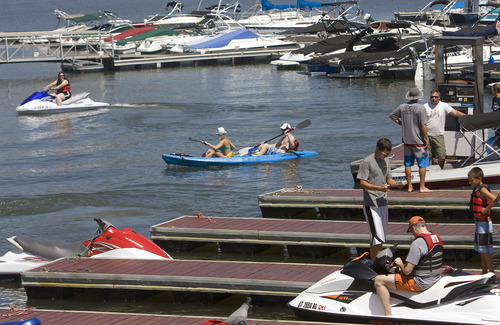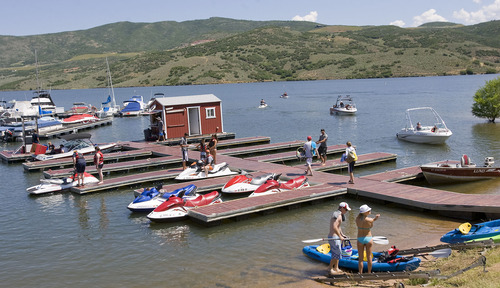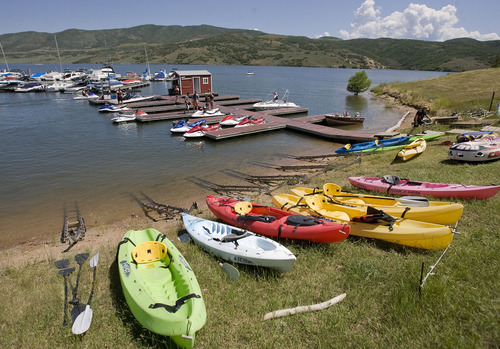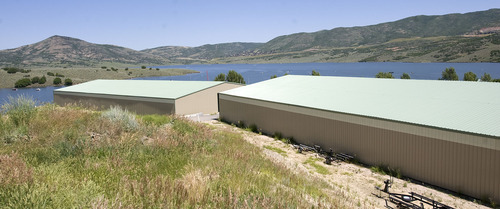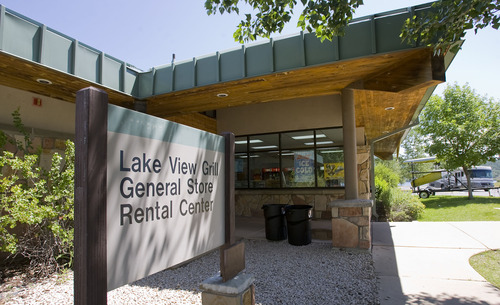This is an archived article that was published on sltrib.com in 2011, and information in the article may be outdated. It is provided only for personal research purposes and may not be reprinted.
Want to rent a boat at Bear Lake, order a hamburger at Wasatch Mountain's golf course, ride a horse at Snow Canyon, stay at a cabin inside Kodachrome Basin or buy some last-minute camping supplies at Jordanelle?
Those services are available because concessionaires have contracted with the Utah Division of Parks and Recreation in situations that agency Director Mary Tullius hopes provides visitors with needed services, small-business owners with a chance to make a profit and create jobs in rural parts of Utah and earns revenue for the state.
"Our philosophy on concessions is that they are a public-private opportunity to provide additional and beneficial amenities for visitors," she said. "We look for services that concessionaires can provide that will enhance the experience and bring more people to the park and on a repeat basis. If we can offer equipment rental and food concessions, it makes for a much better recreation experience."
According to Karen Krieger, Utah State Parks assistant director, there are 36 business partners operating in Utah facilities, 26 with longer term contracts.
Some concessionaires such as Alan Larson, who rents six cabins and operates a small store at Kodachrome Basin, have nothing but good to say about their deal with the state.
"We have longer hours and try to stay open later in the evening as folks are trying to get their camp set up," said Larson. "Then if they forgot a bottle of ketchup or something, they can run down and grab it. We try to keep everybody happy. It's a good partnership."
For Bart and Jen Papworth, though, the marriage at Jordanelle State Park turned into a nasty divorce. The couple and its bank recently won a partial summary judgment of $827,101 in 3rd District Court against Utah State Parks covering the cost of building a boat-storage facility.
The couple's contract with the state was terminated in January because the state said they failed to pay $20,000 in rent over a four-year period and did not send the department another $70,000 in required revenue payments. The Papworths have said they did not know about the $5,000 annual rental fee until a 2009 audit discovered the item in the contract.
"They have taken away our retirement, our lives and our children's lives," said Jen Papworth in a March interview. "Our three children had to start over. We don't have a life right now."
Bryce Nielson, a longtime Division of Wildlife Resources biologist at Bear Lake, retired and won the concession contract at the Bear Lake State Park Marina eight years ago. He rents boats and personal watercraft, operates a tour boat, sells gas and provides boat slips. The concession also includes a cafe and a convenience store.
While he appreciates the opportunity to operate at Bear Lake State Park and said that he communicates well with park officials, he said that because he has to bid to renew his contract every five years it is difficult to make long-term plans and investments.
"I can only speak for my concession, but it would be nicer to have a 10- to 15-year contract," he said. "Perhaps you could review the contract every five years, but not for a bid. It would be nice to make major improvements and have enough time to see some returns and make a profit. If I do a good business with no issues, complaints or problems, I would like to continue with the concession and not have it put up for a bid."
Nielson also said his concession is largely a seasonal business running from Memorial Day to Labor Day.
"The season is so short, there is not a lot you can live on," he said. "In my mind, it's a supplementary income business as opposed to a primary income."
Some of the biggest concessionaires include the tubing and cross-country ski operation at Soldier Hollow and climbing and horseback riding at Snow Canyon.
Krieger said the concessionaires pay a percentage of their gross to the state and send sales taxes to local governments. She said her agency has spent the past 18 months looking at how to make better decisions about concessions.
She said state parks ask potential concessionaires to submit business plans and financial documents proving they can do what they say. Those are examined closely to make certain they are realistic.
Some have suggested the agency look at hiring concessionaires to operate campgrounds as the U.S. Forest Service does in most of its locations. Krieger said the agency is looking at the pros and cons of doing that.
What about the idea of leasing out an entire park to private business to operate?
Krieger said that has not worked.
"We have not had as many problems with the concessionaires as we have in the past when we have turned over all management," she said. "Companies only want the parks in the months when they are profitable, but parks are open 24-7, year-round. So that doesn't totally eliminate our obligation."
Nielson said that, as a concessionaire, his responsibility is to make state parks look good and allow the people who come to the marina to have a good time, a safe trip and to enjoy the state facilities they have paid for.
wharton@sltrib.com Twitter: @tribtomwharton —
More online
O Read a related story about state park campground hosts. > sltrib.com.


